A heartwarming tale of how they used the time to beautify the schools where they are quarantined.
Laxmi Negi/Redff.com reports.
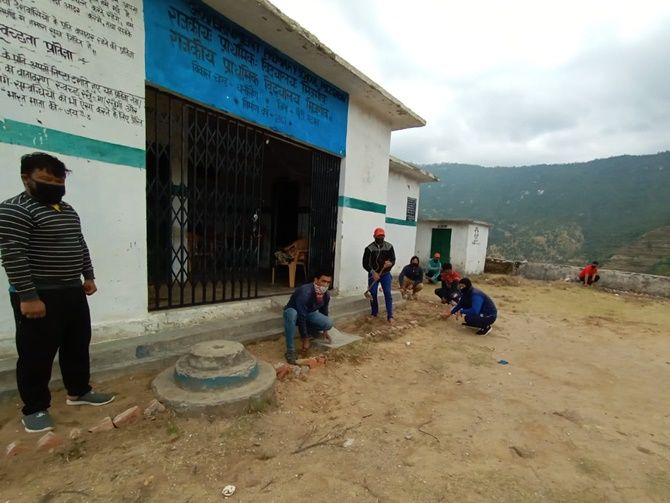
They are in quarantine for the last two months, but these men in the hills of Garhwal are setting new examples of selflessness.
When they were not provided proper lodging and food by the local authorities, they did not complain.
Instead, they set to work.
Though they were exhausted from days of travel on hungry stomachs, they decided they would make their circumstances better instead of battering their heads against the public system.
They began enhancing their quarantine centres. They painted the schools and cleaned the surroundings.
Some of them planted a few saplings.
Now, all they hope is that their good work is remembered.
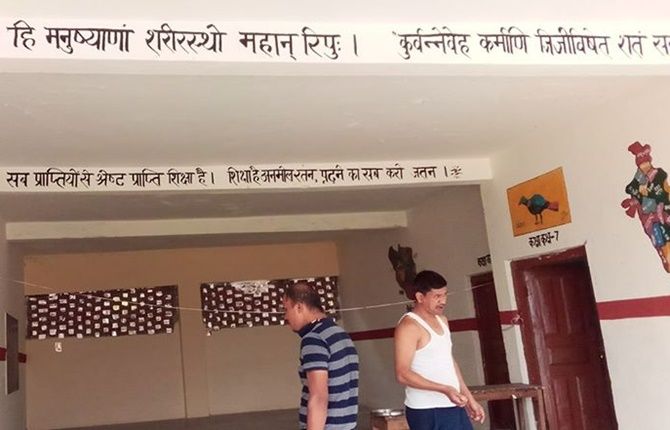
Jaman Singh Chauhan answers his phone instantaneously, his voice content."Mein azaad ho gaya (I have been freed)," he declares.
The 30-year-old native of a small hamlet called Badeth in Pauri district in the hills of Uttrakhand cannot contain his happiness. The doctor at the health centre in Paithani had declared him 'fit' earlier in the day.
The moment he left the quarantine facility -- the Rashtriya Prathamik Vidyalaya, Badeth --, on his way to the health centre, he climbed a kafal (Himalayan wild bayberry) tree and gathered a pocketful of the sweet-sour berries.
"After eight long years, I am home in the kafal season and I could not resist," he says.
Kafal is the state fruit of Uttarakhand. It grows on small-sized trees or shrubs. Its fruiting season commences from mid-May and continues till June.
In that moment, he forgot how, barely a few weeks ago, he was cooped up with his co-workers in a small hotel in Jalandhar.
One by one, his co-workers started leaving for their respective villages, leaving him alone and homesick.
He began to fear he would be stuck all alone in the city and regretted ignoring his parents's requests for his immediate return.
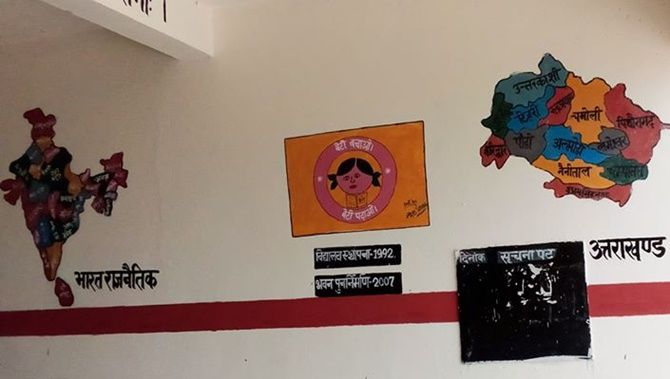
Subsequently, he endured a rough two-day journey, crammed into a tempo with six other men from different villages in his district of Pauri.
His journey ended after a gruelling 12 kilometre walk to the designated quarantine facility in his village, which was to be his home for the next couple of weeks.
To his horror, the school which was closed for last two months was not habitable.
"'There was no bedding and the village sarpanch told us no food will be provided. I called my parents who, from then on, provided all the meals," he says.
"The anganwadi centre located just below this school had cooking facilities like a gas stove, but we were denied permission to use it. After that, I did not want to ask anything from the village authorities," he adds.
After a few days, he started feeling restless.
"For the first few days," he says, "you want to rest, but gradually you are overcome by boredom."
A group of 10 to 12 men quarantined at the centre along with him and, to pass the time, they started looking for activities to keep themselves busy.
Incidentally, this was the same school they had studied at until Class 8. And now, it was in a state of complete disrepair.
A spare can of paint was stored in a corner.
The men decided to put their time to good use and undertake maintenance and painting work.

Pahadis -- as people who live in hilly and mountainous terrain are called -- are not used to complaining.
"We make do with whatever is available," he says.
His co-habitant in quarantine, Laxman Singh Chauhan, had travelled four gruelling days on a Shramik train from Hyderabad to reach Pauri.
He too didn't lose time and started guiding the other men in cleaning and painting the school where his 13-year-old daughter currently studies.
"She has been coming here three-four times a day to give me meals and tea. She was surprised to see us painting and has followed the progress from then on," he smiles.
The 40 year old beams with pride and says, "Now, my daughter will think of me whenever she is in school."
He is happy that he has helped improve the school's infrastructure.
"All of us have the basic know-how of painting; we do it all the time in our houses here in the village. So when we saw the paint lying here, we made use of our talent."
"No one asked us or forced us; we did this out of our own free will."
Ask them if they will return to the city for work and Jaman Singh replies firmly, "No." He plans to buy a buffalo or start poultry farming.
But Sarat Singh Chauhan, who started working in an export firm in New Delhi, says, "I have no option but to return when this pandemic ends.
His wife, who had joined him a few months ago in the capital, is too scared to venture out now. "It was her first trip to any city and she suffered. She refuses to even think about going to anywhere out of her village now," says Sarat Singh.
Cleaning the school premises
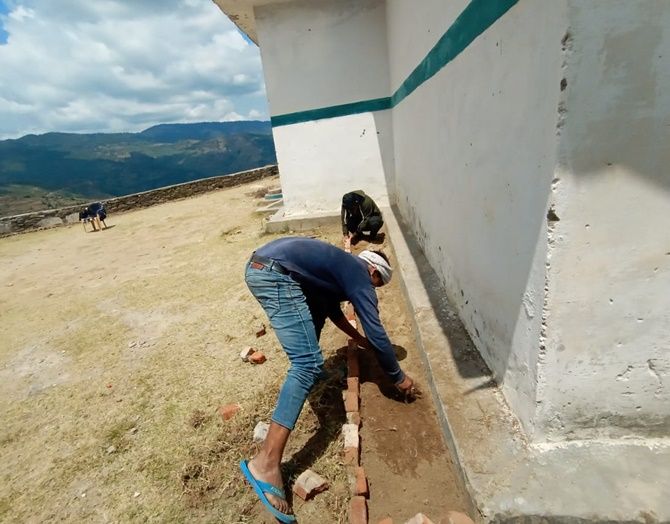
The youth of Pauri's Mijgaon village keep a check on each other through their WhatsApp group.
"After the men from our village started returning, our group has become all the more active," says Prabhat Singh Chauhan, who works for Uttrakhand Tourism in Dehradun. "Whatever they need in the quarantine facility is provided to them."
The village sarpanch, he says, let them down as there was no arrangement of food and lodging.
"It is shocking that the sarpanch did not visit the quarantine centre. But what can we expect as, in the last 10 years, nothing has changed in our village? There has been no development here," alleges Prabhat Singh.
When his cousin and six others returned to their village from Pune, they were put up at the Rashtriya Prathamik Vidyalaya, Mijgaon.
"In Pune," says Pradeep Singh, "we ran from pillar to post to get passes and kept waiting for our names to appear on the government Web site for travel, but it didn't happen."
So 19 of them got together and booked a private bus, each paying Rs 8,000, and reached home in four days.
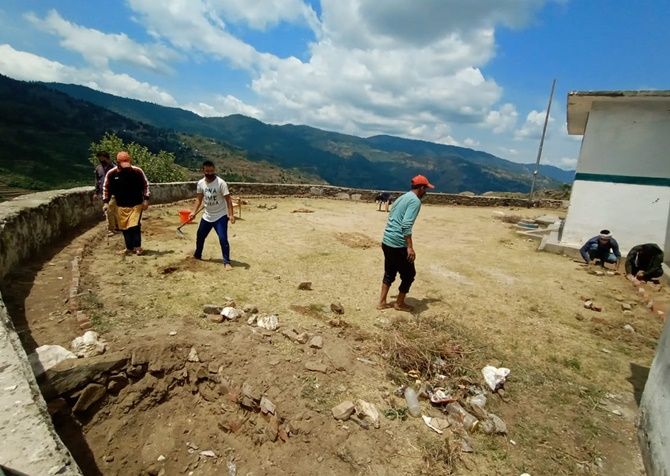
At the district headquarters, Pauri, they were asked some basic questions if any of them had any symptoms and, surprisingly, did not have to undergo any tests.
Pradeep, 27, who works at a canteen in Pune, says, "We told the authorities we are travelling from Maharashtra, one of the worst-hit states, but they just checked our temperatures and asked us to proceed."
"When were travelling in the bus, I was sure we would be put up in the school and, since it was closed for few months I was sure it must not have been cleaned. I was thinking of cleaning the premises," he adds.
"When we reached, the condition of the school was as poor as we had imagined. Since there was no bedding available, we asked our families to make the arrangements along with meals."
"We asked the sarpanch to give us spades, shovels and digging trowels, but all we got was lip service," he adds.
"Later, we asked our families to get us tools from our homes and we started with the cleaning work. There were lots of weeds and the ground was uneven," he says. "There were plenty of bricks scattered around, so we collected those and put them to use."
"Who doesn't like stay in a clean environment? It looks much nicer now!"
"This cleaning of our school is just the beginning," he says. "We want to do a lot more. There is no stopping us now."
"We have been informed that people travelling from Maharashtra will be in quarantine for 21 days. We are fine with it. We will co-operate because, at the end, the health of our families is at stake," says Pradeep.
"Here, our villagers have to travel for almost 2 to 3 hours to a hospital for a small fracture. If this pandemic hits us, we are doomed," says Sandeep Singh Chauhan, who has also returned from Pune.
Another problem for the nine men in quarantine is water scarcity.
"The neighbouring villages don't have a problem, but we don't get proper water supply in our village. Water scarcity is worst during these times and one of the hindrances in our cleanliness drive," says Sandeep.

Anand Singh Negi, who works as part of the kitchen staff in Chandigarh, patiently waited for his name to appear on the government Webs ite to get the green signal to travel to his native place.
He had all the necessary papers when he got into the Uttarakhand government bus with his two children and his wife.
They got the go-ahead from the Chandigarh police after completing the screening and other necessary check-ups and were re-checked at Haridwar and finally at the district HQ, Pauri.
After two gruelling days of travel, they finally reached their village and were immediately directed to the quarantine facility.
His parents had come to welcome him, but had to maintain a safe distance. They wanted to hug them, but could not risk it.
For the first few days, their village sarpanch -- not the same sarpanch mentioned above -- provided Anand Singh's family and seven other people in the quarantine centre with food prepared from his home.
After four days, they were provided dry rations and they started cooking in the school premises. The gas stove was provided by their sarpanch, Uttam Singh Negi.

When he reached the school premises, he too was not happy with its condition and joined in the clean-up with the other men.
He also cleaned the surroundings and planted some marigold saplings.
For now, Anand Singh wants his children to enjoy the environment in their village.
When it comes to the other children, he hopes they will remember him and the others for the good work they did at their school.











